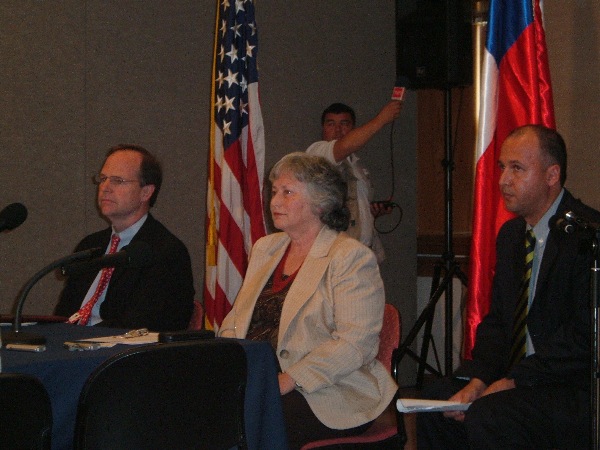
Olga weisfieler, pictured here with US Ambassador to Chile, Paul Simons, left
Matt Malinowski, Santiago Times
Olga Weisfeiler this week disclosed a letter to Chilean President
Michelle Bachelet questioning Chile’s willingness to investigate the 1985
disappearance of her brother, Boris Weisfeiler. The letter, written in
late February, comes after Weisfeiler vented her frustration over the
case’s lack of new leads during her most recent trip to Chile (ST, Jan.
30).
Boris Weisfeiler, a naturalized U.S. citizen originally from Russia, was a math professor at Pennsylvania State University. He disappeared under suspicious circumstances in 1985 - the waning years of the Augusto Pinochet dictatorship - while hiking in the south of Chile.
The government of former dictator Pinochet maintained that Weisfeiler had simply drowned while hiking near Region VIII’s Ñuble River. Still, Olga refused to believe these claims.
“The one thing that we do know for sure, along with (investigating) Judge Jorge Zepeda, is that my brother did not accidentally die while crossing a river, but was murdered. This fact I have known all along,” Weisfeiler said in her letter, which was shared with the Santiago Times.
Then, in 1987, a Chilean military informant known only as “Daniel,” appeared and told U.S. embassy officials that he was a member of a patrol that arrested a foreign hiker two years earlier and concluded he was a Russian spy. According to the informant, Boris was alive and being held in Colonia Dignidad, a secretive colony founded by a known pedophile and former member of Nazi Germany's air force Paul Schaefer.
Besides ruling his followers with an iron fist, Schafer turned the colony into a torture center used by Pinochet’s secret police force during the 17-year dictatorship. It was not until Chile’s return to democracy in the 1990s that the charitable tax status of his organization was revoked and Schaefer prosecuted for crimes committed in Chile.
Encouraged by the declassification of U.S. government documents, Olga first came to Chile to search for information about her brother’s death in 2000. In subsequent trips, she met with dozens of officials, including U.S. ambassadors, judges, and Michelle Bachelet, who was serving as Chile’s Defense Minister at the time. Olga would meet with Bachelet again in 2006 after she had assumed the presidency.
Still, advances in the case proved to be short-lived. Olga visited the Colonia Dignidad, located near the Region VII town of Parral, in 2004 and 2007. But she always left the colony unsatisfied.
Meanwhile, in January, Weisfeiler disclosed that many U.S. documents had still not been translated into Spanish, and that Judge Jorge Zepeda, who is currently in charge of the case, has “has not responded to offers of help from the United States embassy, which includes the cooperation of the F.B.I.” (ST, Jan. 30)
“For my family and I, this is an incomprehensible position on part of the judge and Chile’s government,” Weisfeiler wrote.
Weisfeiler’s letter went on to blast the investigation for its lack of rigor and organization, stating that Chile’s Secretary of War Gonzalo Garcia Pino had assured her in January that, “his office never received a request from Judge Zepeda to search for any military involvement in Prof. Weisfeiler’s disappearance.” She added that the Chilean Directorate of Intelligence (CNI) also did not receive any such request, even though some declassified documents suggest the organization’s involvement in Weisfeiler’s disappearance.
Additionally, she lamented that, “the chief PICH (Police Investigations Unit) investigator is to be replaced once again on March 1; the next one will be the sixth officer-in-charge in eight years of investigations. With each such replacement in the investigation, it has set us back to square one.”
“Regrettably, as of today, nothing has changed. After eight years of investigation conducted by the Chilean judiciary, we are no closer to a resolution that we were in 2000 when that investigation began…You, of all people, must know how I feel after 23 years of fruitless searching and now eight years of empty promises of thorough investigation and resolution of my brother’s case. As President, you have the power to change this grim situation, and I appeal to you to do so.”
This news comes as Secretary of State Rice is set to arrive in Chile later this month. Although the final details are still being worked out, Chilean Foreign Minister Alejandro Foxley said last week that he, together with President Bachelet, plan to discuss bilateral and multilateral issues with Rice, including the United Nations, the Doha Round, and increasing academic and technological exchanges between the two countries (ST, March 3).
By Matt Malinowski (editorATsantiagotimes.cl)